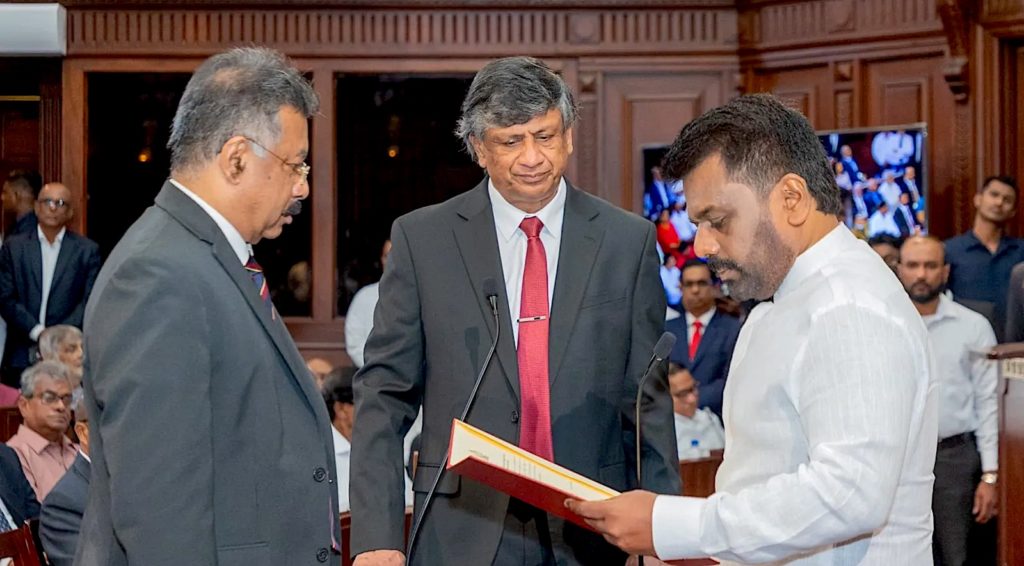Photo courtesy of Indian Express
Sri Lanka’s 2024 presidential election has marked a historic shift in the political landscape with Anura Kumara Dissanayake securing a decisive victory. The election is seen as a resounding rejection of the established political elites who have long dominated Sri Lankan politics and a clear demand for reform, transparency and an end to corruption. This victory not only signals hope for the poor and middle class but also reaffirms the maturity of Sri Lanka’s democracy.
President Dissanayake’s victory resonates most deeply with Sri Lanka’s lower and middle income citizens who have borne the brunt of economic mismanagement, rampant inflation and widening inequality in recent years. His economic platform was grounded in a promise to reduce the gap between the wealthy and the disadvantaged and restore financial discipline to government institutions.
His economic policies propose measures to tackle corruption, which has historically drained public resources, and invest in sectors that would benefit the common people such as healthcare and education. President Dissanayake has also emphasized the importance of addressing the debt crisis responsibly, ensuring that Sri Lanka is not overly dependent on foreign aid or loans that cripple its financial independence.
The emphasis on curbing inflation, controlling the cost of living and ensuring that tax reforms benefit the majority rather than an elite few gained him strong support from working class citizens who had seen little benefit from the free market policies of previous governments.
Perhaps the most significant aspect of President Dissanayake’s appeal was his unflinching stance against corruption and the deeply entrenched kleptocracy that has characterized Sri Lankan politics for years. Successive administrations, often plagued by nepotism and cronyism, failed to address the economic and social issues of the people while enriching themselves.
President Dissanayake’s commitment to transparency, accountability and a streamlined government resonated with a populace tired of seeing the political elite accumulate wealth at their expense. His pledge to implement anti-corruption measures, revamp state institutions and hold corrupt officials accountable created a sense of hope for a clean, efficient and responsive government.
This is why the poor and middle classes turned out in large numbers to vote for him – they saw in him a leader who truly understood their struggles and who was genuinely committed to rooting out corruption at every level of government.
While President Dissanayake’s victory has been met with celebration among his supporters, there remains apprehension among some who remember the violent insurgencies led by the JVP in the 1970s and 1980s. The party’s association with those bloody uprisings has led some to fear instability or authoritarianism under his leadership.
However, President Dissanayake and the modern day JVP have distanced themselves from the party’s radical past, transitioning into a legitimate democratic force. Over the years, the JVP has participated in elections, operated within the political framework and pushed for reform rather than revolution. President Dissanayake himself has emphasized non-violence, respect for democratic principles and a desire to heal rather than divide the country.
The fact that President Dissanayake won through a peaceful, democratic election is evidence that the JVP has evolved. His administration is poised to work within Sri Lanka’s political institutions to bring about necessary reforms, not through force but through legislation and good governance.
President Dissanayake’s election victory also showcases the maturity of Sri Lanka’s democracy. In a country with a rich and complex history marked by colonial rule, ethnic conflict and political instability, the fact that Sri Lankans were able to peacefully elect a leader who represents change is a testament to their faith in democratic processes.
This election has proven that the electorate is no longer willing to tolerate corruption or incompetence regardless of the political party in power. Sri Lankans are demanding more from their leaders and they are increasingly making their voices heard through the ballot box. This peaceful transition of power reinforces the idea that Sri Lanka is entering a new era of political accountability and transparency.
While concerns remain about the JVP’s history, President Dissanayake has made it clear that his focus is on reform, not revolution. His vision for Sri Lanka is one of unity, prosperity and fairness – a future where the people’s needs come first and where corruption is no longer tolerated.
Sri Lanka’s electorate has spoken and its message is clear; people want an end to the old politics of nepotism and corruption. They want a government that works for them, not for a privileged few. Under President Dissanayake’s leadership, Sri Lanka has the opportunity to turn a new page and there is every reason to believe that the country will emerge stronger, more democratic and more just in the years ahead.
For Sri Lanka, this election marks the beginning of a journey toward a brighter future, one that promises to empower the poor and middle class, address corruption and build a more inclusive and prosperous society. President Dissanayake’s victory, far from being a cause for concern, is a testament to the resilience and maturity of Sri Lanka’s democracy.
